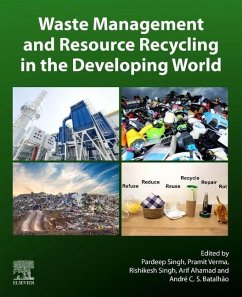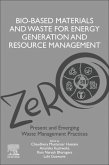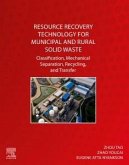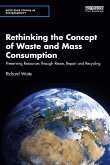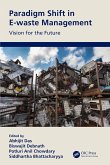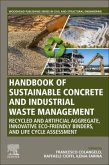Waste Management and Resource Recycling in the Developing World
Herausgeber: Batalhao, Andre C. S.; Singh, Rishikesh; Verma, Pramit; Singh, Pardeep; Ahamad, Arif
Waste Management and Resource Recycling in the Developing World
Herausgeber: Batalhao, Andre C. S.; Singh, Rishikesh; Verma, Pramit; Singh, Pardeep; Ahamad, Arif
- Broschiertes Buch
- Merkliste
- Auf die Merkliste
- Bewerten Bewerten
- Teilen
- Produkt teilen
- Produkterinnerung
- Produkterinnerung
Waste Management and Resource Recycling in the Developing World provides a unique perspective on the state of waste management and resource recycling in the developing world, offering practical solutions based on innovative tools and technologies, along with examples and case studies. The book is organized by waste type, including electronic, industrial and biomedical/hazardous, with each section covering advanced techniques, such as remote sensing and GIS, as well as socioeconomic factors, transnational transport and policy implications. Waste managers, environmental scientists,…mehr
Andere Kunden interessierten sich auch für
![Bio-Based Materials and Waste for Energy Generation and Resource Management Bio-Based Materials and Waste for Energy Generation and Resource Management]() Bio-Based Materials and Waste for Energy Generation and Resource Management146,99 €
Bio-Based Materials and Waste for Energy Generation and Resource Management146,99 €![Resource Recovery Technology for Municipal and Rural Solid Waste Resource Recovery Technology for Municipal and Rural Solid Waste]() Zhao Youcai (Professor of environmental engineering at School of EnResource Recovery Technology for Municipal and Rural Solid Waste142,99 €
Zhao Youcai (Professor of environmental engineering at School of EnResource Recovery Technology for Municipal and Rural Solid Waste142,99 €![Rethinking the Concept of Waste and Mass Consumption Rethinking the Concept of Waste and Mass Consumption]() Richard WaiteRethinking the Concept of Waste and Mass Consumption58,99 €
Richard WaiteRethinking the Concept of Waste and Mass Consumption58,99 €![Paradigm Shift in E-waste Management Paradigm Shift in E-waste Management]() Paradigm Shift in E-waste Management128,99 €
Paradigm Shift in E-waste Management128,99 €![Project Management, Planning and Control Project Management, Planning and Control]() Albert LesterProject Management, Planning and Control76,99 €
Albert LesterProject Management, Planning and Control76,99 €![Handbook of Sustainable Concrete and Industrial Waste Management Handbook of Sustainable Concrete and Industrial Waste Management]() Handbook of Sustainable Concrete and Industrial Waste Management203,99 €
Handbook of Sustainable Concrete and Industrial Waste Management203,99 €![Handbook of Recycling Handbook of Recycling]() Handbook of Recycling131,99 €
Handbook of Recycling131,99 €-
-
-
Waste Management and Resource Recycling in the Developing World provides a unique perspective on the state of waste management and resource recycling in the developing world, offering practical solutions based on innovative tools and technologies, along with examples and case studies. The book is organized by waste type, including electronic, industrial and biomedical/hazardous, with each section covering advanced techniques, such as remote sensing and GIS, as well as socioeconomic factors, transnational transport and policy implications. Waste managers, environmental scientists, sustainability practitioners, and engineers will find this a valuable resource for addressing the challenges of waste management in the developing world.
Produktdetails
- Produktdetails
- Verlag: Elsevier - Health Sciences Division
- Seitenzahl: 870
- Erscheinungstermin: 9. Dezember 2022
- Englisch
- Abmessung: 193mm x 250mm x 49mm
- Gewicht: 1790g
- ISBN-13: 9780323904636
- ISBN-10: 0323904637
- Artikelnr.: 63400634
- Herstellerkennzeichnung
- Libri GmbH
- Europaallee 1
- 36244 Bad Hersfeld
- gpsr@libri.de
- Verlag: Elsevier - Health Sciences Division
- Seitenzahl: 870
- Erscheinungstermin: 9. Dezember 2022
- Englisch
- Abmessung: 193mm x 250mm x 49mm
- Gewicht: 1790g
- ISBN-13: 9780323904636
- ISBN-10: 0323904637
- Artikelnr.: 63400634
- Herstellerkennzeichnung
- Libri GmbH
- Europaallee 1
- 36244 Bad Hersfeld
- gpsr@libri.de
1. Waste generation in Brazil: municipal, agricultural and industrial
wastes
2. Generation of Waste: Problem to Possible Solution in Developing and
Underdeveloped Nations
3. Use of participatory methodologies to improve the Urban Solid Waste
Management System in Cape Verde - Sal Island
4. Waste Characterization in Brazil
5. E-Waste Management- Sources, Strategies, Impacts and Consequences
6. Translational Transport of E-Waste and implications on human well beings
and the environment
7. Electronic (e-waste) Conduct: Chemical assessment and treatment methods
8. Biological methods for the treatment of e-waste
9. Chemical Methods for the treatment of e-waste
10. E-Waste Management Using Different Cost-Effective, Eco-friendly
Biological Techniques: An Overview
11. Life cycle assessment of e-waste management: Current practices and
future research agenda towards sustainability
12. E-waste: Policies and Legislations for a sustainable green growth
13. E-waste policies and implementation: a global perspective
14. The future of e-waste in the circular economy of Ghana: Implications
for urban planning, environmental and human health risks
15. The role of the informal sector on e-waste management: a case study
from Brazil
16. Recent Perspectives of Nanoparticles in Industrial Waste Management-an
overview
17. Advances in industrial waste management
18. Nano- and microplastics in the environment: a potential threat to
in-situ bioremediation of wastewaters
19. Biological Methods For The Treatment Of Industrial Waste
20. Adsorptive Removal Of Hazardous Dyes From Industrial Waste Using
Activated Carbon: An Appraisal
21. Hazardous waste management lessons from developed countries
22. Hazardous biomedical waste management scenario of the developing
countries
23. Chemical methods for the treatment of biomedical hazardous waste
24. Advances in Biomedical waste management technologies
25. Biological treatment of pharmaceutical wastes
26. Municipal solid waste management, its fate and waste-to-energy in the
context of a developing economy like India
27. Applications of waste-to-economy practices in urban water sector:
Implications for Environmentaland Human health
28. Cost-benefit analysis act as a tool for evaluation of waste to the
economy: A synthesis
29. Conversion of waste materials into different by-products of economic
value
30. Vermicomposting - the sustainable Solid Waste Management
31. Sustainability Of Biorefineries For Waste Management
32. Municipal solid waste management in Brazil: overview and trade-offs
between different treatment technologies
33. Waste management practices in a developing nation: Challenges and
opportunities
wastes
2. Generation of Waste: Problem to Possible Solution in Developing and
Underdeveloped Nations
3. Use of participatory methodologies to improve the Urban Solid Waste
Management System in Cape Verde - Sal Island
4. Waste Characterization in Brazil
5. E-Waste Management- Sources, Strategies, Impacts and Consequences
6. Translational Transport of E-Waste and implications on human well beings
and the environment
7. Electronic (e-waste) Conduct: Chemical assessment and treatment methods
8. Biological methods for the treatment of e-waste
9. Chemical Methods for the treatment of e-waste
10. E-Waste Management Using Different Cost-Effective, Eco-friendly
Biological Techniques: An Overview
11. Life cycle assessment of e-waste management: Current practices and
future research agenda towards sustainability
12. E-waste: Policies and Legislations for a sustainable green growth
13. E-waste policies and implementation: a global perspective
14. The future of e-waste in the circular economy of Ghana: Implications
for urban planning, environmental and human health risks
15. The role of the informal sector on e-waste management: a case study
from Brazil
16. Recent Perspectives of Nanoparticles in Industrial Waste Management-an
overview
17. Advances in industrial waste management
18. Nano- and microplastics in the environment: a potential threat to
in-situ bioremediation of wastewaters
19. Biological Methods For The Treatment Of Industrial Waste
20. Adsorptive Removal Of Hazardous Dyes From Industrial Waste Using
Activated Carbon: An Appraisal
21. Hazardous waste management lessons from developed countries
22. Hazardous biomedical waste management scenario of the developing
countries
23. Chemical methods for the treatment of biomedical hazardous waste
24. Advances in Biomedical waste management technologies
25. Biological treatment of pharmaceutical wastes
26. Municipal solid waste management, its fate and waste-to-energy in the
context of a developing economy like India
27. Applications of waste-to-economy practices in urban water sector:
Implications for Environmentaland Human health
28. Cost-benefit analysis act as a tool for evaluation of waste to the
economy: A synthesis
29. Conversion of waste materials into different by-products of economic
value
30. Vermicomposting - the sustainable Solid Waste Management
31. Sustainability Of Biorefineries For Waste Management
32. Municipal solid waste management in Brazil: overview and trade-offs
between different treatment technologies
33. Waste management practices in a developing nation: Challenges and
opportunities
1. Waste generation in Brazil: municipal, agricultural and industrial
wastes
2. Generation of Waste: Problem to Possible Solution in Developing and
Underdeveloped Nations
3. Use of participatory methodologies to improve the Urban Solid Waste
Management System in Cape Verde - Sal Island
4. Waste Characterization in Brazil
5. E-Waste Management- Sources, Strategies, Impacts and Consequences
6. Translational Transport of E-Waste and implications on human well beings
and the environment
7. Electronic (e-waste) Conduct: Chemical assessment and treatment methods
8. Biological methods for the treatment of e-waste
9. Chemical Methods for the treatment of e-waste
10. E-Waste Management Using Different Cost-Effective, Eco-friendly
Biological Techniques: An Overview
11. Life cycle assessment of e-waste management: Current practices and
future research agenda towards sustainability
12. E-waste: Policies and Legislations for a sustainable green growth
13. E-waste policies and implementation: a global perspective
14. The future of e-waste in the circular economy of Ghana: Implications
for urban planning, environmental and human health risks
15. The role of the informal sector on e-waste management: a case study
from Brazil
16. Recent Perspectives of Nanoparticles in Industrial Waste Management-an
overview
17. Advances in industrial waste management
18. Nano- and microplastics in the environment: a potential threat to
in-situ bioremediation of wastewaters
19. Biological Methods For The Treatment Of Industrial Waste
20. Adsorptive Removal Of Hazardous Dyes From Industrial Waste Using
Activated Carbon: An Appraisal
21. Hazardous waste management lessons from developed countries
22. Hazardous biomedical waste management scenario of the developing
countries
23. Chemical methods for the treatment of biomedical hazardous waste
24. Advances in Biomedical waste management technologies
25. Biological treatment of pharmaceutical wastes
26. Municipal solid waste management, its fate and waste-to-energy in the
context of a developing economy like India
27. Applications of waste-to-economy practices in urban water sector:
Implications for Environmentaland Human health
28. Cost-benefit analysis act as a tool for evaluation of waste to the
economy: A synthesis
29. Conversion of waste materials into different by-products of economic
value
30. Vermicomposting - the sustainable Solid Waste Management
31. Sustainability Of Biorefineries For Waste Management
32. Municipal solid waste management in Brazil: overview and trade-offs
between different treatment technologies
33. Waste management practices in a developing nation: Challenges and
opportunities
wastes
2. Generation of Waste: Problem to Possible Solution in Developing and
Underdeveloped Nations
3. Use of participatory methodologies to improve the Urban Solid Waste
Management System in Cape Verde - Sal Island
4. Waste Characterization in Brazil
5. E-Waste Management- Sources, Strategies, Impacts and Consequences
6. Translational Transport of E-Waste and implications on human well beings
and the environment
7. Electronic (e-waste) Conduct: Chemical assessment and treatment methods
8. Biological methods for the treatment of e-waste
9. Chemical Methods for the treatment of e-waste
10. E-Waste Management Using Different Cost-Effective, Eco-friendly
Biological Techniques: An Overview
11. Life cycle assessment of e-waste management: Current practices and
future research agenda towards sustainability
12. E-waste: Policies and Legislations for a sustainable green growth
13. E-waste policies and implementation: a global perspective
14. The future of e-waste in the circular economy of Ghana: Implications
for urban planning, environmental and human health risks
15. The role of the informal sector on e-waste management: a case study
from Brazil
16. Recent Perspectives of Nanoparticles in Industrial Waste Management-an
overview
17. Advances in industrial waste management
18. Nano- and microplastics in the environment: a potential threat to
in-situ bioremediation of wastewaters
19. Biological Methods For The Treatment Of Industrial Waste
20. Adsorptive Removal Of Hazardous Dyes From Industrial Waste Using
Activated Carbon: An Appraisal
21. Hazardous waste management lessons from developed countries
22. Hazardous biomedical waste management scenario of the developing
countries
23. Chemical methods for the treatment of biomedical hazardous waste
24. Advances in Biomedical waste management technologies
25. Biological treatment of pharmaceutical wastes
26. Municipal solid waste management, its fate and waste-to-energy in the
context of a developing economy like India
27. Applications of waste-to-economy practices in urban water sector:
Implications for Environmentaland Human health
28. Cost-benefit analysis act as a tool for evaluation of waste to the
economy: A synthesis
29. Conversion of waste materials into different by-products of economic
value
30. Vermicomposting - the sustainable Solid Waste Management
31. Sustainability Of Biorefineries For Waste Management
32. Municipal solid waste management in Brazil: overview and trade-offs
between different treatment technologies
33. Waste management practices in a developing nation: Challenges and
opportunities

